词句精讲精练
Module8Storytime词句精讲精练

Module8Storytime词句精讲精练Module 8 Story time词句精讲精练1. asleepasleep 是形容词,意为“睡着的” ,但它只能作表语,不能⽤very 修饰,只能⽤much、fast 等词修饰。
它作定语时,只能位于所修饰词之后。
反义词为“awake ”。
例如:Don'ttalk loud when others are asleep. 别⼈睡着的时候不要⼤声说话。
The boy asleep is my brother. 那个睡着的男孩是我弟弟。
【拓展】be asleep、go to sle ep、go to bed 和sleep 的辨析:(1)be asleep表⽰“睡着”的状态。
例如:The baby is fast asleep. 那个婴⼉睡得很熟。
(2)go to sleep = get to sleep = fall asleep 强调进⼊梦乡的动作。
例如:He was just falling asleep when there was a loud knock at the door.他刚睡着,就有⼈使劲敲门。
I don't know when I went to sleep / got to sleep last night. 我不知道昨晚什么时候睡着的。
(3)go to bed意为“就寝,上床睡觉”,着重指上床准备睡觉的动作。
⼀般来说,go to bed在前,然后才go to sleep 或fall asleep。
例如:He usually goes to bed at ten and goes to sleep five minutes later.他通常⼗点上床睡觉,五分钟后⼊睡。
(4)sleep强调“睡觉”动作,是延续性动词,可与表⽰时间段的状语连⽤。
例如:Did you sleep well last night? 你昨晚睡得好吗?2. pickpick意为“采,摘”,常⽤于词组“ pick up ”,意为“拾起,捡起”,当宾语为代词时,宾语应放在pick 和up 中间;当宾语为名词时,宾语可放中间,也可放在后⾯。
九年级英语上册 Review of Unit 1-2词句精讲精练 (新版)仁爱版
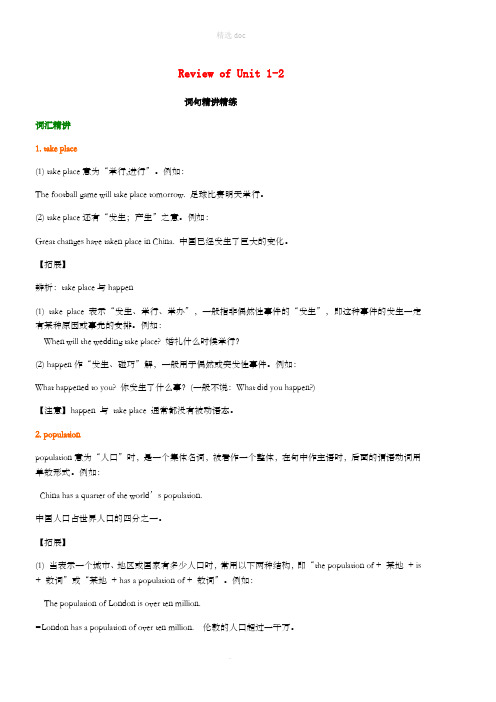
Review of Unit 1-2词句精讲精练词汇精讲1. take place(1) take place意为“举行,进行”。
例如:The football game will take place tomorrow. 足球比赛明天举行。
(2) take place还有“发生;产生”之意。
例如:Great changes have taken place in China. 中国已经发生了巨大的变化。
【拓展】辨析:take place与happen(1) take place 表示“发生、举行、举办”,一般指非偶然性事件的“发生”,即这种事件的发生一定有某种原因或事先的安排。
例如:When will the wedding take place? 婚礼什么时候举行?(2) happen作“发生、碰巧”解,一般用于偶然或突发性事件。
例如:What happened to you? 你发生了什么事?(一般不说:What did you happen?)【注意】happen 与take place 通常都没有被动语态。
2. populationpopulation意为“人口”时,是一个集体名词,被看作一个整体,在句中作主语时,后面的谓语动词用单数形式。
例如:China has a quarter of the world’s population.中国人口占世界人口的四分之一。
【拓展】(1) 当表示一个城市、地区或国家有多少人口时,常用以下两种结构,即“the population of + 某地+ is + 数词”或“某地+ has a population of + 数词”。
例如:The population of London is over ten million.=London has a population of over ten million. 伦敦的人口超过一千万。
(2) population可与large,small搭配,但不能与many,few搭配。
译林版九年级上初三英语第一单元词句精讲精练(含答案)
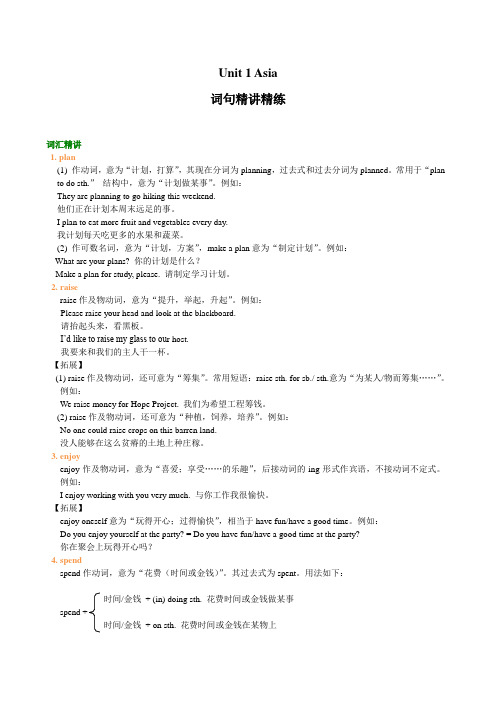
Unit 1 Asia词句精讲精练词汇精讲1. plan(1) 作动词,意为“计划,打算”,其现在分词为planning,过去式和过去分词为planned。
常用于“planto do sth.”结构中,意为“计划做某事”。
例如:They are planning to go hiking this weekend.他们正在计划本周末远足的事。
I plan to eat more fruit and vegetables every day.我计划每天吃更多的水果和蔬菜。
(2) 作可数名词,意为“计划,方案”,make a plan意为“制定计划”。
例如:What are your plans? 你的计划是什么?Make a plan for study, please. 请制定学习计划。
2. raiseraise作及物动词,意为“提升,举起,升起”。
例如:Please raise your head and look at the blackboard.请抬起头来,看黑板。
I’d like to raise my glass to ou r host.我要来和我们的主人干一杯。
【拓展】(1) raise作及物动词,还可意为“筹集”。
常用短语:raise sth. for sb./ sth.意为“为某人/物而筹集……”。
例如:We raise money for Hope Project.我们为希望工程筹钱。
(2) raise作及物动词,还可意为“种植,饲养,培养”。
例如:No one could raise crops on this barren land.没人能够在这么贫瘠的土地上种庄稼。
3. enjoyenjoy作及物动词,意为“喜爱;享受……的乐趣”,后接动词的-ing形式作宾语,不接动词不定式。
例如:I enjoy working with you very much. 与你工作我很愉快。
八年级英语下册《Review of Units 5-6》词句精讲精练 (新版)仁爱版-(新版)仁爱版

Review of Units 5-6词句精讲精练词汇精讲1. also, too&eitheralso; too与either都有“也”的意思,但用法不同:(1)also用于肯定句,位置通常位于句中,比too更为正式。
例如:I also go to work by bike. 我也骑自行车上班。
(2)too用于肯定句且置于句末,其前用逗号隔开;在简略答语中too常置于代词的宾格形式之后。
例如:— Tom likes music and Mary does, too. 汤姆喜欢音乐,玛丽也喜欢。
— Me, too. 我也是。
Jack is a worker, too. Jack也是工人。
(3)either用于否定句且置于句末,其前用逗号隔开。
例如:He can’t swim. I can’t swim, either. 他不会游泳,我也不会。
2. though&although(1)用作连词,表示“虽然”,二者可以互换使用,但although比though更为正式。
例如:Though/Although it was raining, we still went there. 虽然下着雨,但我们还是去了那里。
(2)although一般不用作副词,而though可用作副词,且一般放在句末(不放在句首),意为“可是,不过”。
例如:It’s hard work; I enjoy it, though. 工作很辛苦,可是我很喜欢。
We all tried our best. We lost the game, though. 我们都尽力最大努力,但我们还是输了。
(3)在as though(好像,仿佛),even though(即使,纵然)等固定短语中不能用although。
例如: He talks as though he knew everything. 他夸夸其谈,好像无所不知。
3. proudproud 是形容词,常用结构:be proud of sth. 意为“以……而骄傲”。
译林版七年级上初一英语第四单元词句精讲精练(含答案)
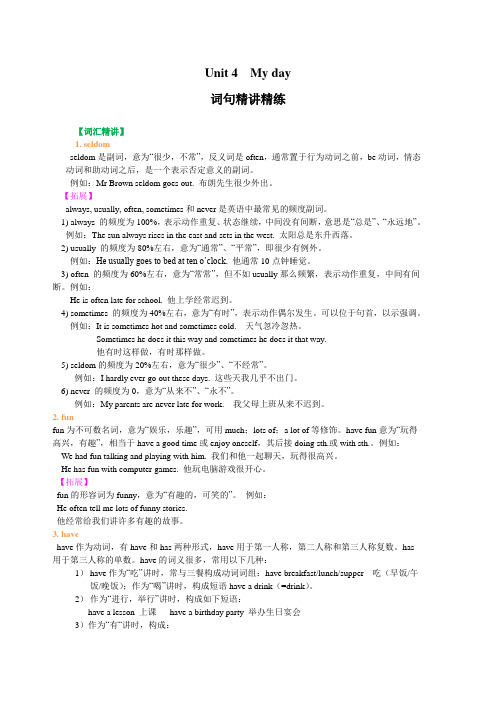
Unit 4 My day词句精讲精练【词汇精讲】1. seldomseldom是副词,意为“很少,不常”,反义词是often,通常置于行为动词之前,be动词,情态动词和助动词之后,是一个表示否定意义的副词。
例如:Mr Brown seldom goes out. 布朗先生很少外出。
【拓展】always, usually, often, sometimes和never是英语中最常见的频度副词。
1)always 的频度为100%,表示动作重复、状态继续,中间没有间断,意思是“总是”、“永远地”。
例如:The sun always rises in the east and sets in the west. 太阳总是东升西落。
2) usually 的频度为80%左右,意为“通常”、“平常”,即很少有例外。
例如:He usually goes to bed at ten o’clock. 他通常10点钟睡觉。
3) often 的频度为60%左右,意为“常常”,但不如usually那么频繁,表示动作重复,中间有间断。
例如:He is often late for school. 他上学经常迟到。
4) sometimes 的频度为40%左右,意为“有时”,表示动作偶尔发生。
可以位于句首,以示强调。
例如:It is sometimes hot and sometimes cold. 天气忽冷忽热。
Sometimes he does it this way and sometimes he does it that way.他有时这样做,有时那样做。
5) seldom的频度为20%左右,意为“很少”、“不经常”。
例如:I hardly ever go out these days. 这些天我几乎不出门。
6) never 的频度为0,意为“从来不”、“永不”。
例如:My parents are never late for work. 我父母上班从来不迟到。
译林版九年级上初三英语第二单元词句精讲精练(含答案)
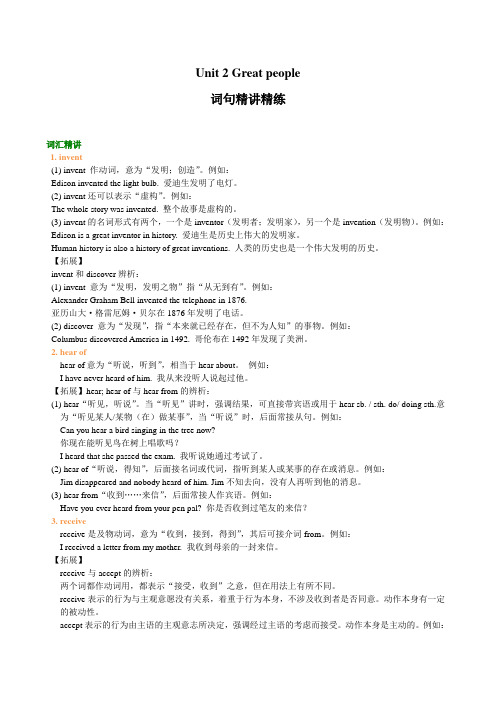
Unit 2 Great people词句精讲精练词汇精讲1. invent(1) invent 作动词,意为“发明;创造”。
例如:Edison invented the light bulb. 爱迪生发明了电灯。
(2) invent还可以表示“虚构”。
例如:The whole story was invented. 整个故事是虚构的。
(3) invent的名词形式有两个,一个是inventor(发明者;发明家),另一个是invention(发明物)。
例如:Edison is a great inventor in history. 爱迪生是历史上伟大的发明家。
Human history is also a history of great inventions. 人类的历史也是一个伟大发明的历史。
【拓展】invent和discover辨析:(1) invent 意为“发明,发明之物”指“从无到有”。
例如:Alexander Graham Bell invented the telephone in 1876.亚历山大·格雷厄姆·贝尔在1876年发明了电话。
(2) discover 意为“发现”,指“本来就已经存在,但不为人知”的事物。
例如:Columbus discovered America in 1492. 哥伦布在1492年发现了美洲。
2. hear ofhear of意为“听说,听到”,相当于hear about。
例如:I have never heard of him. 我从来没听人说起过他。
【拓展】hear; hear of与hear from的辨析:(1) hear“听见,听说”。
当“听见”讲时,强调结果,可直接带宾语或用于hear sb. / sth. do/ doing sth.意为“听见某人/某物(在)做某事”,当“听说”时,后面常接从句。
例如:Can you hear a bird singing in the tree now?你现在能听见鸟在树上唱歌吗?I heard that she passed the exam. 我听说她通过考试了。
初二英语:ReviewofUnits6-10词句精讲精练综合演练
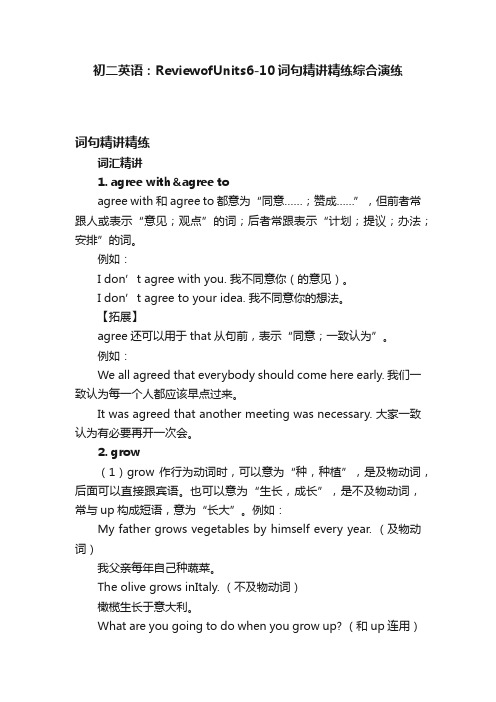
初二英语:ReviewofUnits6-10词句精讲精练综合演练词句精讲精练词汇精讲1. agree with&agree toagree with和agree to都意为“同意……;赞成……”,但前者常跟人或表示“意见;观点”的词;后者常跟表示“计划;提议;办法;安排”的词。
例如:I don’t agree with you. 我不同意你(的意见)。
I don’t agree to your idea. 我不同意你的想法。
【拓展】agree还可以用于that从句前,表示“同意;一致认为”。
例如:We all agreed that everybody should come here early. 我们一致认为每一个人都应该早点过来。
It was agreed that another meeting was necessary. 大家一致认为有必要再开一次会。
2. grow(1)grow 作行为动词时,可以意为“种,种植”,是及物动词,后面可以直接跟宾语。
也可以意为“生长,成长”,是不及物动词,常与up构成短语,意为“长大”。
例如:My father grows vegetables by himself every year. (及物动词)我父亲每年自己种蔬菜。
The olive grows inItaly. (不及物动词)橄榄生长于意大利。
What are you going to do when you grow up? (和up连用)你长大后打算干什么?(2)grow 作连系动词,意为“逐渐变得”,后接形容词作表语。
例如:Truth never grows old. 真理永远不会变老。
The world is growing smaller. 世界在逐渐变小3. can与be able to(1)be able to 和can有时可以互换,但是can只用于一般现在时和一般过去时,而be able to有多种时态形式。
译林版九年级上初三英语第二单元词句精讲精练(含答案)

Unit 2 Colours词句精讲精练词汇精讲1. wonderwonder作及物动词,意为“想知道;对……感到怀疑”,常见的用法有:(1)后接who, what,why,where 等引导的宾语从句。
例如:I wonder who she is. 我想知道她是谁。
She wondered what the child was doing.她感到疑惑,孩子究竟在干什么。
I wonder why Ann is late. 我想知道安为什么迟到了。
I wonder where they have gone. 我想知道他们去哪儿了。
(2)后接that 引导的宾语从句,表示“对……感到惊讶”,that常可省去。
例如:I wonder (that) she has won the race.我对她赢了比赛感到惊讶。
(3)后接if 或whether 引导的宾语从句,常用来表示一种委婉的请求或疑问。
例如:She wondered whether you were free that morning.她想知道你那天上午是否有空。
I wonder if he will succeed.我不知道他会不会成功。
2. come truecome true意为“(理想、梦想等)实现”。
come作系动词,表示“变得”,其后常接一些表示好的、积极的形容词,如:true; right等。
Your dream will come true if you work hard. 如果你努力工作,你的梦想会实现的。
【辨析】come true 与realizecome true和realize均可表示“实现”之意,但come true的主语常是物或事,如:愿望、理想、目标等。
例如:His wish to be an actor has come true. 他想当演员的愿望实现了。
realize是及物动词,其主语常是人。
例如:She realized her dream finally. 她最终实现了她的梦想。
- 1、下载文档前请自行甄别文档内容的完整性,平台不提供额外的编辑、内容补充、找答案等附加服务。
- 2、"仅部分预览"的文档,不可在线预览部分如存在完整性等问题,可反馈申请退款(可完整预览的文档不适用该条件!)。
- 3、如文档侵犯您的权益,请联系客服反馈,我们会尽快为您处理(人工客服工作时间:9:00-18:30)。
Module 3 Journey to space词句精讲精练词汇精讲1. earthearth为名词,意为“泥土,土壤”;earth为名词,还意为“地球”,通常需要在前面加上定冠词the。
例如:The trees and grasses can stop the wind from blowing the earth away.树和草可以阻止风把土吹走。
The floor is earth but hard.虽然是泥地, 但是很坚实。
The earth goes around the sun.地球绕着太阳转。
2. reach(1)reach意为“到达”,是及物动词,可以直接接宾语。
例如:I’ll call you as soon as I reach New York.我一到达纽约就给你打电话。
When we reached the station, the train had left.当我们到达车站时,火车已经离开了。
【拓展】表示“到达”的词汇还有get to和arrive in。
例如:They arrived in Beijing yesterday. 他们昨天到的北京。
He arrives at school at eight every morning. 他每天早上八点到达学校。
When you arrive home, please give me a call. 到家的时候请给我打个电话。
They’ll get to Beijing at six tonight.他们将在今晚六点到达北京。
I’ll get there on time. 我会按时到达那里。
(2)reach意为“够得到”,后面直接接宾语。
例如:He tries to get the apple above the shelf,but fails to reach it.他尽力去够架子上的苹果,但是没够着。
3. yet(1) yet作副词,意为“到此时,至今,还,尚未”,用于否定句中。
例如:We ha ven’t heard from him yet. 我们还没有收到他的来信。
I’m not yet sure if we could win. 我还没有把握确定我们是否能赢。
(2) 作副词,意为“已经”,用于疑问句中。
例如:Is everything ready yet? 一切准备就绪了吗?Has the ship left yet? 轮船已经离开了吗?(3) 作副词,意为“仍然,还是”,用于肯定句中。
例如:He’s yet a chi ld. 他还是个孩子。
(4) 作连词,意为“然而,可是”。
例如:You can draw a horse in five minutes, yet you kept me waiting for a year, why?你能在五分钟之内画好一匹马,然而你却让我等了一年,为什么?He trained hard all year, yet she didn’t win a prize in the competition.他全年都艰苦训练,然而在竞赛中却没能获奖。
【拓展】yet和already的辨析:yet用于疑问句或否定句时,放在句末。
例如:Have you finished yet? 你完成了吗?He hasn’t done it yet. 他还没有干完呢。
already常用于肯定陈述句中,一般位于助动词之后,实义动词之前。
例如:The train has already left. 火车已经开走了。
4. alone(1) alone作副词,意为“单独地,孤独地”,相当于by oneself。
例如:It was too heavy for me to carry the bag alone. 我独自背这个袋子,真是太重了。
(2) alone作形容词,意为“单独的,独自的”,只能作表语,不能作定语。
例如:He was alone in the house. 他一个人在屋子里。
【辨析】alone和lonelyalone既可作形容词,也可作副词,表示“单独一人,无人相伴”,陈述客观事实。
lonely只能作形容词,表示“孤独的,寂寞的”,带有强烈的感情色彩;此外,还可表示“荒凉的,偏僻的”,常作定语。
例如:Though the old man is alone, he doesn’t feel lonely.虽然那位老人是一个人,但他并不感到寂寞。
My grandfather used to live in a lonely village.我爷爷过去住在一个偏僻的小村庄里。
5. discoverdiscover是动词,意为“发现”,其后可接名词、代词、疑问词+不定式及that从句等。
例如:We never discovered how to open the box. 我们从未弄清楚如何打开这个盒子。
【拓展】(1) discover意为“发现”,指有意或无意地发现已经存在尚不为人知的事物。
例如:China has discovered oil under the South China Sea. 中国在南海发现了石油。
(2) find意为“找到、发现”,指偶然发现或经过一番寻找,找到值得或所需的东西,强调找的结果。
例如:I found the book I was looking for. 我找到了一直在找的书。
(3) find out意为“查明白、弄清楚”,多用于经过调查、分析、研究等手段查出的情况,查出的东西往往是抽象的,如时间、事实、真相等。
例如:Please find out when the meeting starts. 请查一下会议什么时候开始。
(4) invent意为“发明”指经过研究、设计而创造出原本未有的东西。
例如:Cai Lun invented the paper. 蔡伦发明了纸。
6. nonenone意为“没有,都不”,表示全部否定,可指人或物,常与of 连用,后接可数名词时,谓语动词用单、复数形式均可,接不可数名词时,谓语动词只能用单数形式。
常回答how many/much的问句。
例如:—How many students are there in the classroom? 教室里有多少学生?—None. 一个也没有。
None of us likes her. 我们当中没有一个人喜欢她。
【拓展】(1)no one = nobody意为“没有人”,单独作主语,其谓语动词用单数形式,其后不能接of…结构。
在简略回答中,回答who的问句。
例如:—Who is in the room? 谁在房间里?—No one. 没有人。
Nobody will make friends with him.没有人愿意与他交朋友。
(2) nothing意为“没有什么,没有东西”,只能指物,常用来回答What’s in…? 例如:—What’s in the box? 箱子里有什么?—Nothing. 什么都没有。
7. light(1)light作不可数名词,意为“光;光亮;光线”。
例如:The sun gives out light and heat.太阳发出光和热。
He read the letter by the light of the candle.他在烛光下读那封信。
(2)light作可数名词,意为“电灯;光源”。
例如;Don’t cross the road when the traffic lights are red.当交通灯是红色时,不要横穿马路。
(3)light作形容词,意为“轻的;浅色的”。
例如:Is the box heavy or light?那箱子是重还是轻?I like the light green dress.我喜欢哪件浅绿色的裙子。
(4)light作动词,意为“点燃;照亮”。
例如:He sat down and lit a cigarette.他坐下来,点了一支烟。
8. finishfinish意为“完成,结束”,作及物动词时,其后可跟名词、代词或动名词。
即:finish sth.或finish doing sth.。
例如:I finished my homework this morning. 我今天上午做完了作业。
When did you finish drawing the picture? 你什么时候画完那副画的?【拓展】能接v.-ing作宾语的动词还有:practice; enjoy; mind; keep等。
practice doing sth. 练习做某事enjoy doing sth.喜欢做某事mind doing sth.介意做某事keep doing sth. 一直做某事词汇精练I. 英汉短语互译。
1.be up to ________________2.far away_________________3.on the earth _______________4.billions of ________________5.as… as…________________6.没问题________________7.上网________________8.搜索________________9.多于,超过________________10.和某人交流________________II. 根据句意和首字母提示完成单词。
1.There are s______ books on the shelf.2.There is the earth,the sun,the moon and many other stars in the u______.3.We are a______ on the island,but we don't feel lonely.4.She's j______ eaten her lunch.5.How do you change our e______?6.We sent the i______ to the earth.7.He's g______ to Beijing,so you can’t see him now.III. 用括号内所给词的适当形式填空。
1.We all know the earth ______(go)around the sun.2.There are ______(billion)of stars in our galaxy.3.My mother isn't at home.She ______(go)to Shanghai.So my father and I should take care of my old grandma.4.How large is the universe? No one ______(know).5.I have finished ______(read)the book.1. Have you______ been to New York?2.I haven't been to New York______.But I'll go there this summer.3.I don't believe your family has owned a truck ______ over 90 years.4.My parents are _______ late for work. They always get up early.5.He’s ______ told his parents about his plans.【参考答案】I. 英汉短语互译。
